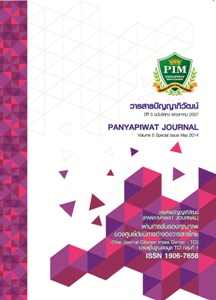ปัจจัยสำคัญที่ส่งผลต่อความสำเร็จของวิธีการสอนแบบเน้นงานปฏิบัติในชั้นเรียนภาษาอังกฤษ
Main Article Content
บทคัดย่อ
บทคัดย่อ
วัตถุประสงค์ของงานวิจัยนี้ เพื่อศึกษาว่าการสอนแบบเน้นงานปฏิบัติส่งเสริมการเรียนภาษาอังกฤษของนักศึกษาระดับอุดมศึกษาของสถาบันการจัดการปัญญาภิวัฒน์หรือไม่ กลุ่มตัวอย่างได้แก่นักศึกษาปีที่ 1 จำนวน 36 คนในชั้นเรียนปกติ เครื่องมือวิจัยที่ใช้ในการเก็บข้อมูลได้แก่ แผนการสอน สื่อการสอน การสัมภาษณ์ และบันทึกหลังการสอน การวิเคราะห์ข้อมูลเชิงคุณภาพจากการสัมภาษณ์ และบันทึกหลังการสอน พบว่า มีปัจจัยสำคัญบางประการส่งผลต่อความสำเร็จของการใช้วิธีการสอนแบบเน้นงานปฏิบัติ ได้แก่ (1) การสร้างแรงจูงใจในการเรียนของนักเรียน (2) การส่งเสริมการจัดการเรียนรู้แบบร่วมมือ และ (3) ข้อจำกัดของการสอนแบบเน้นงานปฏิบัติ การอภิปรายผลนำเสนอสิ่งที่ควรพิจารณาเพื่อลดข้อจำกัด ซึ่งสามารถกระทำก่อนการสอนเพื่อประสิทธิผลของการจัดการการเรียนการสอนด้วยวิธีนี้
Article Details
“ข้าพเจ้าและผู้เขียนร่วม (ถ้ามี) ขอรับรองว่า บทความที่เสนอมานี้ยังไม่เคยได้รับการตีพิมพ์และไม่ได้อยู่ระหว่างกระบวนการพิจารณาลงตีพิมพ์ในวารสารหรือแหล่งเผยแพร่อื่นใด ข้าพเจ้าและผู้เขียนร่วมยอมรับหลักเกณฑ์การพิจารณาต้นฉบับ ทั้งยินยอมให้กองบรรณาธิการมีสิทธิ์พิจารณาและตรวจแก้ต้นฉบับได้ตามที่เห็นสมควร พร้อมนี้ขอมอบลิขสิทธิ์บทความที่ได้รับการตีพิมพ์ให้แก่สถาบันการจัดการปัญญาภิวัฒน์หากมีการฟ้องร้องเรื่องการละเมิดลิขสิทธิ์เกี่ยวกับภาพ กราฟ ข้อความส่วนใดส่วนหนึ่งและ/หรือข้อคิดเห็นที่ปรากฏในบทความข้าพเจ้าและผู้เขียนร่วมยินยอมรับผิดชอบแต่เพียงฝ่ายเดียว”
เอกสารอ้างอิง
Bancha Yooyong. (2008). The use of task-based learning to develop English speaking ability of Mattayomsuksa 2 students at Ban Markkaeng school in Udon Thani. Thesis. Srinakharinwirot University.
Ellis, R. (1997). Second language acquisition. Oxford: Oxford University Press.
Ellis, R. (2003). Task-based language learning and teaching. Oxford: Oxford University Press.
Farahani, A. and Nejad, M. (2009). A study of task-based approach: the effects of task-based techniques, gender, and different levels of language proficiency on speaking development. Pazhuhesh-e Zabanha-ye Khareji, No. 49, Special Issue, English, Winter, pp. 23-41.
Hall, G. (2011). Exploring English language teaching language in action. Oxford: Routledge.
Ismaili, M. (2013). The effectiveness of the task-based learning in developing students' speaking skills in academic settings on the EFL classroom. 14 Albania International Conference on Education (AICE).
Johnson, D. and Johnson, R. (2009). An educational psychology success story: social interdependence theory and cooperative learning. Educational Researcher. No. 38, pp. 365-379.
Lightbown, P. and Spada, N. (1999). How languages are learned. Oxford: Oxford University Press.
Long, M. H. (1991). Focus on form: A design feature in language teaching methodology. In deBot, K.,Ginsberg, R. B., & Kramsch, C. (eds.), Foreign Language Research in Cross-cultural Perspective.pp. 39-52. Amsterdam: John Benjamins.
Meng, Y. and Cheng, B. (2010). College students' perceptions on the issues of task-based language teaching in Mainland China. Journal of Language Teaching and Research. Vol. 1, No. 4,pp. 434-442.
Nunan, D. (2004). Task-based language teaching. Cambridge: Cambridge University Press.
Phahol Ruamjai. (2009). The development of English speaking ability for tourism communication of Mattayomsuksa Ill students in Phangna through task-based learning and real-life situation practice. Thesis. Srinakharinwirot University.
Uraiwan Sae-ong. (2010). The use of task-based learning and group work incorporating to develop English ability of Mattayom Suksa 4 students. Srinakharinwirot University.
Widdowson, H. G. (2003). Defining issues in English language teaching. Oxford: Oxford University Press.
Willis, D. and J. (2007). Doing task-Based teaching. Oxford: Oxford University Press.
Xiongyong, C. and Samuel, M. (2011). Perceptions and implementation of task-based language teaching among secondary school EFL teachers in China. International Journal of Business and Social Science. Vol. 2, No. 24 [Special Issue - December 2011] 292.
Yim, S. H. (2009). South Korean teachers' perceptions of TBLT. Retrieved December 10, 2012, from http://www.tesolreview.org/


